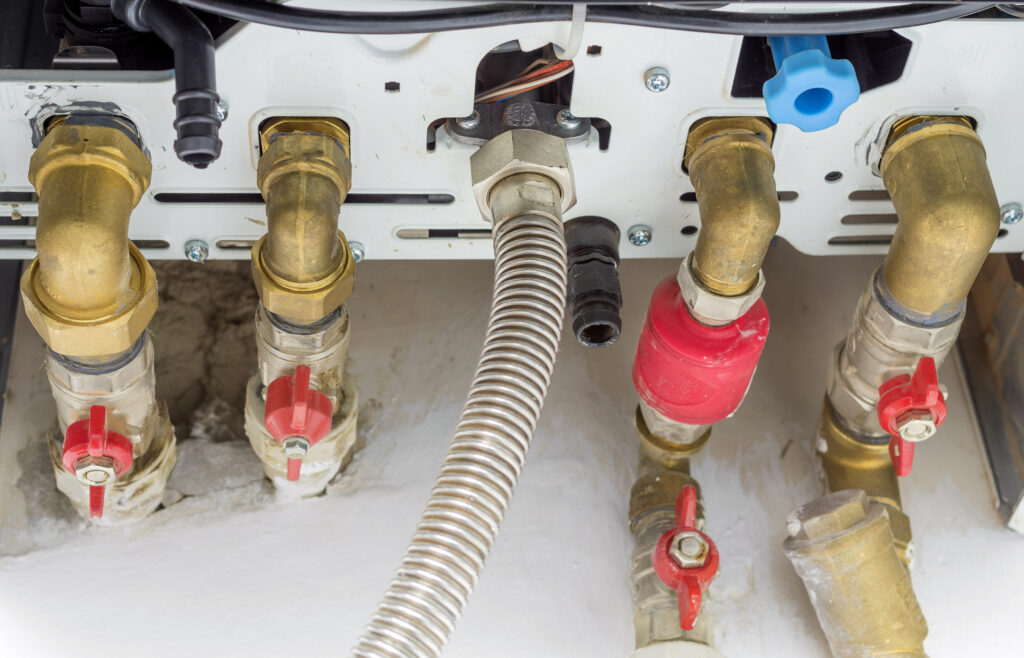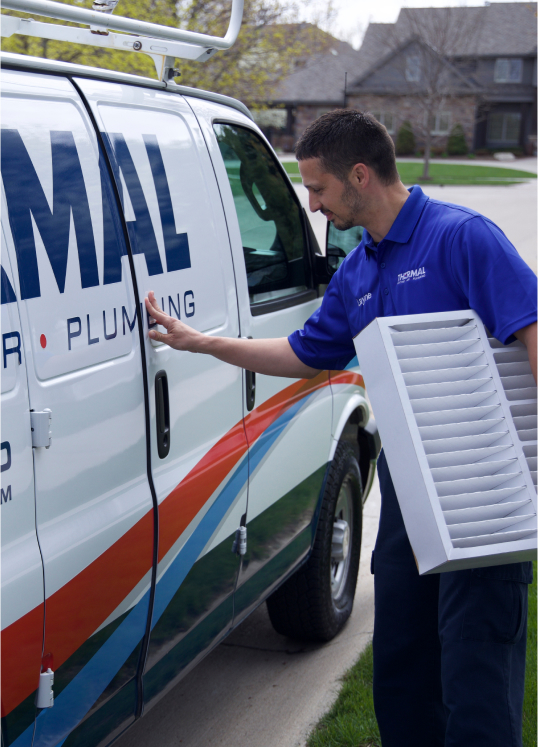Gas lines are a significant component of your home’s infrastructure, delivering reliable energy to power appliances like water heaters, stoves, and dryers, though these lines require expert care and precision. Thermal Heating, Air & Plumbing has been the trusted choice for gas line services in Omaha, NE, and Council Bluffs, IA, for over 50 years.
Our licensed, insured technicians use the latest tools and techniques to handle every job with top-level craftsmanship. Whether you’re installing a new appliance, upgrading your system, or addressing a needed repair, we make the process a breeze.
Schedule a gas line consultation with our expert team now.

Gas Line Installation for New Appliances
Installing a gas line requires precision and expertise to ensure safety and performance. At Thermal Heating, Air & Plumbing, we handle installations for appliances like gas stoves, furnaces, and traditional and tankless water heaters.
Our team carefully evaluates your current system, ensuring your new appliance integrates seamlessly without the risk of pressure issues or inefficiencies. Every detail, from permits to testing, is handled with care and adherence to local safety standards.
Emergency Gas Line Plumbing Repair
Gas line problems demand swift action to protect your home and loved ones. Common warning signs, be it a sulfur-like odor, hissing sounds near pipes, or sudden spikes in your gas bill, should never be ignored. If you suspect a leak, evacuate your property, avoid using electronics or open flames, and call 911. Once the area has been secured, Thermal Heating, Air & Plumbing is ready to step in.
Our 24/7 emergency repair team specializes in identifying and resolving gas line problems with a sense of urgency. Equipped with advanced diagnostic tools, we can locate leaks or damages that might otherwise go unnoticed. With a focus on safety and efficiency, we ensure your gas system is restored to full functionality.
Signs You Need Gas Line Plumbing Services
Some gas line problems can go unnoticed until they cause significant issues. Common signs that it’s time to call in a professional include:
- Frequent repairs: If gas-powered appliances like your stove or water heater repeatedly break down, the gas line may be the underlying problem. A professional inspection can identify and resolve the issue.
- Leaks: A sulfur-like smell, dead vegetation near outdoor gas lines, or an unexpected increase in your gas bill are common indicators of a leak. Addressing leaks quickly is critical for safety and efficiency.
- Rising gas consumption: Higher gas bills without increased usage often indicate inefficiencies or small leaks in the line. Fixing these issues improves safety and reduces utility costs.
- Remodeling or renovation projects: Home renovations involving new gas appliances or layout changes may require adjustments to your gas lines. A professional ensures the work is done safely and meets local codes.
Why Choose Thermal for Gas Line Plumbing?
When it comes to gas line solutions, getting it done right is everything. That’s why Thermal Heating, Air & Plumbing has leveraged over 50 years of expertise to earn the trust of homeowners in Omaha, NE, and Council Bluffs, IA. We know how important your home’s safety and comfort are, which is why every project we take on is handled with the precision and care it deserves.
When you choose us, you’ll enjoy:
- Same-day and 24/7 emergency availability
- Licensed, insured, and background-checked technicians
- Free replacement estimates
- Service for all major appliance brands
- Transparent, upfront pricing
Contact us now and discover the Thermal difference for your home in Omaha, NE, & Council Bluffs, IA.
Gas Line Plumbing FAQs
What’s the best way to prevent gas line issues?
Routine maintenance and inspections are key to catching potential problems early. We recommend having your gas lines professionally checked every one to two years for leaks, pressure issues, or signs of wear.
How long do gas lines typically last?
With proper care, high-quality gas lines can last 30 years or more. Factors like environmental conditions and regular use will impact their lifespan, making periodic inspections a must.







